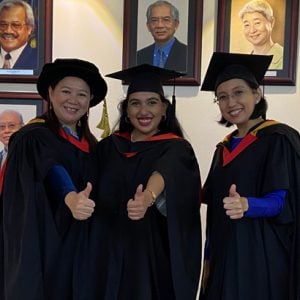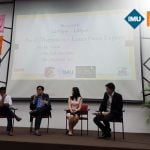Tan Chen Hui is one of the IMU pharmacy students who completed her placement at Hospital Tengku Ampuan Rahimah Klang.
The Clinical Pharmacy III module in Semester 8 of the Bachelor of Pharmacy (Hons) programme [BPharm (Hons)] at International Medical University (IMU) has provided opportunities to the pharmacy students to acquire real-life hospital pharmacy experience. The hospital pharmacy placement is mandatory for all students and the duration is for a period of four weeks. This placement is in addition to other mandatory placements in the community pharmacy and pharmaceutical industrial setting in the BPharm (Hons) curriculum. Furthermore, the students can also use the Elective opportunity and gain additional placement opportunities. The school takes the responsibility to arrange all the mandatory placements for all students in each cohort with the support of the respective departments.
Tan Chen Hui and Ahmad Khairul Daniel bin Ahmad Kamar, two pharmacy students from the BP118 cohort of IMU BPharm (Hons) programme, were allocated to complete their placement at Hospital Tengku Ampuan Rahimah Klang (HTAR), along with eleven other pharmacy students from the same cohort. Chen Hui shared, “This is my first time working in a hospital and I’m excited about it. I have always wondered about the roles of a pharmacist other than dispensing medications. I’m grateful for this golden opportunity provided to me through the IMU BPharm (Hons) programme’s placement to explore a clinical setting despite the unprecedented COVID-19 pandemic situation.”
Throughout the four-week hospital placement, they were rotated to various pharmacy departments at HTAR including wards, inpatient pharmacy and outpatient pharmacy. There are four systemic rotations involved in the ward rounds: Endocrine/Renal, Respiratory, Cardiovascular and Infectious Disease. During each rotation, students were given the chance to clerk real life case for case study and take part in pharmaceutical care discussions. Each discussion was guided by senior clinical pharmacists as preceptors. “It was definitely an interesting experience discovering the workflow in ward pharmacy. There are other healthcare professionals taking care of the patients and the pharmacist is part of the healthcare team. From this observation and experience, I further understand the importance of each healthcare professional’s role in patient care.” said Chen Hui.
Ahmad Khairul Daniel shared, “Interacting with real patients was the most rewarding experience throughout the placement period.” Apart from that, students also had the opportunity to explore the outpatient pharmacy department. Students took part in prescription screening, prescription filling to prescription dispensing and counselling. At the outpatient department, the students were assigned to do the prescription filling. “At first, I spend so much time trying to locate the medication on the shelves. However, after a few prescriptions, I was able to pack the medication within a few minutes,” said Ahmad Khairul Daniel.
The students also had chance to assist the pharmacists with extemporaneous dispensing process. They were also brought to see the value-added service (VAS) offered by HTAR. Some of VAS offered by HTAR are getting medication through appointment, medication through post, Locker 4u, Sistem Pendispensan Ubat Bersepadu (SPUB) and drive-through medication. The students also did counselling on insulin injection under the supervision of a preceptor. Overall, the hospital placement at HTAR was an unforgettable experience. During the placement, the students were able to learn a lot and gained experience working in the hospital setting. From being clueless and overwhelmed with the hospital environment, they can now clerk case and discuss pharmaceutical care plan with the preceptors. “I feel my confidence and preparedness to working life has increased after attending the hospital placement,” said Ahmad Khairul Daniel. It was exciting for the students to observe the practice in actual clinical setting, where they are allowed to read the real patient’s case and discuss the pharmaceutical care issue.











